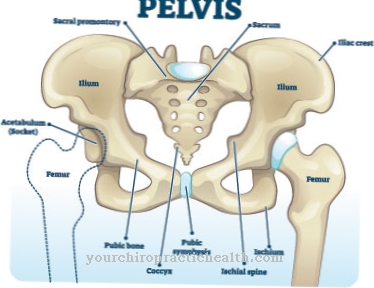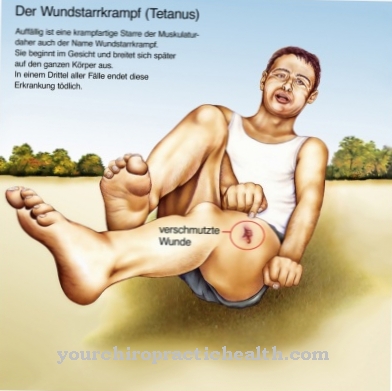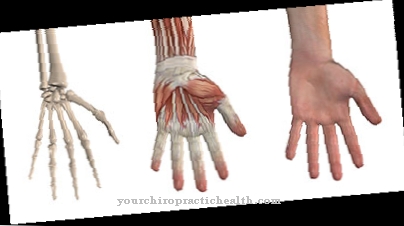The so-called Echopraxia is characterized by the fact that those affected compulsively imitate and repeat the movements of others. The appearance is one of the echomatisms that occur symptomatically in adults in the context of mental illnesses such as Tourette's syndrome or schizophrenia. In some cases, echopraxia can also occur in people with dementia.
What is echopraxia?

© auremar - stock.adobe.com
The term echopraxia means the pathological imitation of observed movements of other people. The complex disorder relates to the motor skills and always occurs involuntarily. In some cases it appears in connection with catatonia as so-called echolalia.
Here those affected are forced to repeat what others have heard. Echopraxia generally occurs in schizophrenia, Asperger's syndrome, autism, oligophrenia, and Tourette's syndrome. In some cases, Alzheimer's patients can also be affected. If only gestures and signs are imitated, what is known as echomimia is spoken of.
causes
The movements of other people are directly mimicked by those affected by echopraxia. In this case, we speak of immediate echopraxia. However, it can also occur with a delay and repeat itself permanently. The so-called Tourette syndrome is a tic disorder in which echopraxia is common.
Those affected involuntarily and suddenly make muscle movements that are often repeated in stereotypical ways. Mostly they are not earmarked either. The clinical picture also occurs in other neurological diseases such as schizophrenia. Usually this is accompanied by symptoms such as hallucinations, disorders of the ego and delusions.
But echopraxia also occurs in global aphasia. This refers to damage to the language center of both hemispheres, which can be caused, for example, by a tumor, trauma or stroke.
You can find your medication here
➔ Medicines for relaxation and nerve strengtheningSymptoms, ailments & signs
The symptoms of echopraxia are characterized by motor tics. They can in some cases be associated with facial twitches, decreased impulse control, throat clearing, and aggressiveness. These tics are very different and individually different. In particularly severe cases, those affected can no longer perform voluntary movements.
The so-called restless legs syndrome is also one of the variants of echopraxia. This clinical picture causes involuntary leg movements. Echopraxia also occurs in children with hyperactivity and attention disorders, various compulsions, self-harm] and many other behavioral disorders. In Tourette's syndrome, the first symptoms usually appear between the ages of two and ten.
The motor tics often appear at the beginning of the disease. A large proportion of those affected suffer from complex tics that affect several muscle areas of the body at the same time. During the course of the disease, echoraxia develops in around 50 percent of cases, which can also spontaneously subside at a later point in time. This process is known as remission. In echopraxia, there are usually accompanying disorders such as obsessive-compulsive disorder or attention disorders.
diagnosis
To diagnose the disease, a detailed anamnesis of the affected person is carried out. The individual symptoms are then observed and analyzed very closely. This takes place over a long period of time in order to be able to classify the severity of the disease.
The diagnosis is made using a questionnaire and an assessment scale, which are specially provided for diagnosing psychological and neurological diseases. The patient's assessment of his or her state of health is also important. The family is also involved.
When should you go to the doctor?
Anyone who repeatedly finds motor tics in themselves or in others should speak to a doctor or go to the doctor together with the person affected. The compulsion to imitate movements indicates echopraxia, which must be treated by a doctor in any case.
It is best to seek medical advice at the first sign of this disorder. If symptoms of echopraxia occur after a trauma, stroke or tumor, the responsible doctor must always be consulted. People who already suffer from a mental illness should go to the responsible therapist immediately with the symptoms mentioned.
If the echopraxia is recognized and treated at an early stage, the chances of recovery are generally very good. In addition to the medical treatment, regular visits to a psychologist are indicated. In severe cases, a temporary stay in hospital is advisable. Since the symptoms of echopraxia can develop very differently, regular check-ups with the doctor are also indicated. If further complaints arise, a change in medication is necessary.
Doctors & therapists in your area
Treatment & Therapy
In most cases, echopraxia can be treated with medication, but the symptoms often do not go away completely. The drugs are used to relieve the appearance. The quality of life of those affected can also be significantly improved from a psychosocial point of view. The therapy facilitates re-entry into society and contributes to the general well-being of the patient.
Since the symptoms of echopraxia vary greatly from person to person, a slow increase in the drug dose is generally recommended. If the therapy works, the dose can be maintained for the time being. However, if the symptoms worsen, it is advisable not to initiate a change in medication until the symptoms have increased again over a period of several weeks. This is to prevent a constant change of medication.
Antipsychotics such as risperidone or aripiprazole are often used to alleviate the symptoms of echopraxia. However, these often lead to unpleasant side effects such as weight fluctuations and fatigue. To counteract this, drugs containing benzamide such as sulpiride or tiapride are used at the same time.
Haloperidol or pimozide are also used for classic therapy in echopraxia. When taking these preparations, side effects are comparatively common. Furthermore, echopraxia is treated with tic-reducing drugs such as tetrabenazine, topiramate and tetrahydrocannabinol.
Outlook & forecast
If echopraxia is diagnosed and treated early, the prospects for recovery are very good. The symptoms usually decrease quickly and well-being slowly increases again. After a few months to a year, most patients are symptom-free. A recurrence of the echopraxia symptoms is conceivable, but very unlikely with appropriate medication.
If left untreated, the disease becomes severe. The symptoms increase rapidly in intensity and significantly reduce the quality of life of the person affected. This often leads to psychological complaints that require independent treatment. The typical tics intensify and cause a multitude of secondary symptoms. In some cases, the behavioral disorders can last a lifetime. The patients then require permanent therapeutic care.
In the case of Tourette's syndrome, full recovery is unlikely. However, the symptoms can be greatly reduced through drug therapy and behavioral therapy. The motor tics can lead to joint damage and other problems. Thanks to modern drugs such as topiramate and tetrabenazine, the prospect of recovery is good.
You can find your medication here
➔ Medicines for relaxation and nerve strengtheningprevention
A disease such as echopraxia cannot generally be prevented. This is especially true for the so-called Tourette syndrome. The reason for this is that these clinical pictures have not been completely defined up to the present time. So there is no corresponding basis for prevention.
However, it is assumed that the causes are partly genetic, but partly also acquired in early childhood. A connection with different stress factors that have an unfavorable effect on brain development in childhood is also conceivable. The stress hormone cortisol plays a not insignificant role here.
But even in adulthood, stressful situations with a simultaneous genetic predisposition can trigger echopraxia. Therefore, any stress should be avoided as a preventive measure. Various relaxation exercises also help here.
Aftercare
Echopraxia can be treated well if diagnosed early. The prospects for recovery are then very good. Antipsychotics are often prescribed to the patient to alleviate the symptoms of echopraxia. Therefore, a regular, specialist examination by the neurologist is necessary.
If echopraxia is not treated, symptoms rapidly increase in intensity. You then limit the quality of life considerably. There are only a few options and influencing factors to cope with everyday life with this disease. It is therefore important to ensure that an echopraxia patient always eats a diet that is low in fat and rich in vitamins and minerals. Smoking, alcohol and even drug abuse worsen the symptoms massively and should be avoided if possible. Stress at work or in everyday life can also trigger symptoms of this disease.
It is recommended that patients with echopraxia join a self-help organization or discussion group close to where they live. Problems of coping with everyday life for echopraxia sufferers can be discussed and discussed in the community and in exchange with people who are equally affected and, if necessary, their relatives.
The self-help group can become a trusting association of those affected and thus serve the psychological stability of the patient. Psychological complaints (e.g. depression) can thus be avoided, which otherwise require independent neurological treatment.
You can do that yourself
Echopraxia is a motor disorder in which third parties are compulsively and involuntarily mimicked. Sometimes words heard are also repeated as a so-called tic. The syndrome often accompanies Asperger's, autism, schizophrenia and Tourette. However, it can also appear due to a trauma or tumor that has caused damage to the speech center of both hemispheres of the brain.
Self-help for those affected is based only on a few possibilities to cope with everyday life independently as far as possible. Since the sudden muscle movements and verbal tics are differently pronounced depending on the case, the therapy plan must also be adhered to in the context of self-help if an anamnesis is made individually.
The tic-reducing drugs can put a lot of stress on the body and cause side effects. Therefore, a low-fat, vitamin and mineral-rich diet should be followed. Bad habits like smoking, alcohol and substance abuse should be avoided. The syndrome can worsen with stress. Regular relaxation exercises and long walks in nature are recommended, if possible with company.
If the symptom can be traced back to a childhood experience, psychotherapy is helpful in coping with the trauma. If echopraxia is accompanied by severe delusions and hallucinations, assisted living should be initiated with regard to the risk of injury to the patient.

.jpg)






















.jpg)



